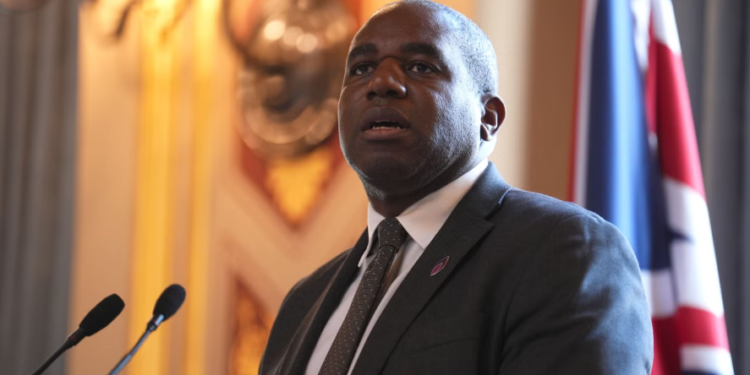March 15, 2025 Story by: Editor
Foreign Secretary David Lammy has stated that it would be “wrong” for Russian President Vladimir Putin to impose conditions on a ceasefire between Russia and Ukraine.
Lammy emphasized that a pause in hostilities would serve as a “first step” toward initiating negotiations for “a full settlement” to end the ongoing conflict. His remarks came as U.S. President Donald Trump expressed concerns that it would be “very disappointing” if Moscow were to reject the ceasefire proposal.
Negotiations between the U.S. and Ukraine led to the idea of a 30-day truce, prompting President Trump to send envoy Steve Witkoff to Moscow to discuss the matter with Kremlin officials.
While Putin acknowledged that “the idea itself is correct, and we certainly support it,” he also stated during a press conference in Moscow that “there are issues that we need to discuss, and I think that we need to discuss it with our American colleagues and partners.”
Speaking from Canada, where he was meeting with G7 counterparts, Lammy highlighted an “opportunity” for achieving “a just and lasting peace” in Ukraine.
“The US and Ukraine have called for a full, immediate and unconditional 30-day ceasefire,” he told The Mirror.
“This would be a first step so that talks can start on a full settlement that protects Ukraine’s security and sovereignty. President Zelensky has shown that Ukraine is the party of peace.
“It would be wrong for Putin to lay conditions. Our support for Ukraine, and that of other partners, remains ironclad.”
Putin and his allies have suggested that Ukraine might be seeking the ceasefire as an opportunity to reorganize its forces, especially as they have been forced out of the Kursk region following their incursion into Russian territory.
“We agree with the proposals to halt the fighting, but we proceed from the assumption that the ceasefire should lead to lasting peace and remove the root causes of the crisis,” Putin stated.
A Kremlin adviser confirmed that Putin was scheduled to meet with Witkoff on Thursday.
Meanwhile, Ukrainian President Volodymyr Zelensky, in his nightly address from Kyiv, accused Putin of being too “afraid” to tell Trump directly that he wants to continue the war.
“That’s why, in Moscow, they are surrounding the ceasefire idea with such preconditions that it either fails or gets dragged out for as long as possible,” he said.
During an Oval Office meeting with NATO Secretary General Mark Rutte, President Trump commented, “A lot of the details of a final agreement have actually been discussed… Now we’re going to see if Russia is there and, if not, it will be a very disappointing moment for the world.”
Additionally, U.S. National Security Adviser Mike Waltz, speaking on Fox News, suggested that Russia might gain control over the Donbas industrial region as part of a peace agreement.
Moscow annexed Donetsk and Luhansk in 2022, forming the Donbas region, though Russian forces do not fully control it.
When asked whether Donbas might be ceded to Putin, Waltz responded, “You’re not wrong in any of that. What’s important is we are discussing those things with both sides.” However, it remains unclear whether he was indicating a formal territorial concession.
Waltz also expressed “cautious optimism” that an agreement might soon be reached following Witkoff’s discussions in Moscow.
Downing Street has reaffirmed its support for Trump’s stance, warning of “very bad” financial consequences for Russia should Putin refuse to engage in peace talks.
When asked about potential increased sanctions, a Downing Street spokesperson stated that “ongoing US, UK and European pressure” would significantly impact Putin’s economic resources.
“President Trump’s leadership to suffocate Russia’s economy is welcome,” a Number 10 spokesman said.
Following Lammy’s G7 discussions, Prime Minister Sir Keir Starmer is set to host a “coalition of the willing” summit on Saturday.
Speaking on Thursday, Starmer stressed the importance of securing a peace deal to prevent Russia’s war from maintaining a “choke hold” on Europe and to deter future aggression.
“I profoundly believe that if we don’t secure just peace and a lasting peace, then that insecurity, which we’ve already felt, will continue.
“That means, here, higher prices, higher bills, the cost-of-living crisis going on for even longer – if you like, a choke hold on our future, which will be much, much harder for us to tackle.
“We know some basics: Putin’s appetite for conflict and for chaos is already there, and it will only grow.
“Russia is already menacing our skies, our waters, our streets and our national security.”
Starmer underscored that any agreement must ensure Ukraine remains “sovereign and secure.”
Defending his decision to propose British troops for a peacekeeping mission, Starmer explained:
“There have been settlements in Ukraine before which had not been backed up. Nobody’s defended the deal, and Putin has just crossed the line again when he wants to.
“That is not good for Ukraine. It’s not good for Europe and it’s not good for us.”
Downing Street has refrained from setting a timeline for when the UK will finalize a plan for the “coalition of the willing,” citing the fluidity of the situation.
Asked when more clarity would emerge, a spokesperson said, “The Prime Minister’s intent is crystal clear.
“I think the nebulous responses are coming from Russia, the ball is in their court.
“There is a proposal there and in the meantime we are concentrating with our international partners on the best way to drive progress to secure that just and lasting peace.” Source: The Independent
















